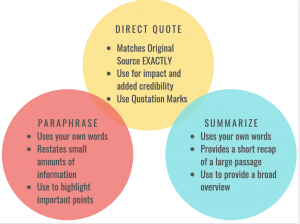8 Keeping a Research Journal
Dr. Karen Palmer
As you research, it’s important to keep a record of the information you find. It might not seem difficult to remember a handful of sources, but, as you continue on in your academic career, you may have a source list of 10, 20, or even more sources for a single paper. Getting in the habit of keeping track of your sources by using a research journal will help you to keep your information organized and make writing your paper much less work.
Keeping a research journal is simple.
- First, create a new Word document.
- As you do your research, take note of the correct citation of each source.
- Write a short summary of the source, including any important notes (ie this source contains a lot of data).
- Finally, write any quotes that stand out. Make sure to put the quotes in quotation marks and add the in-text citation at the end of the quote.
Notes and Quotes
Since, at the note taking stage, you do not know for sure how you will use the information you find, you will not know for sure which kind of notes to take for which sources. Use the following general guidelines to decide:
- Summarize lengthy information that will add to your paper without including the smaller details.
- Paraphrase information and details that will serve as significant support for your core points but that isn’t so eloquently stated that you want to use the exact words. Also, paraphrase texts with vital details that are simply too lengthy to quote.
- Use quotations to emphasize important information that will be very impressive or poignant and that will serve its purpose best if the original words are used. Keep in mind that no more than about 20 percent of your paper should be quoted text. Your paper should be in your words with a few quotations as opposed to a collection of quotations connected with your words.

Think critically about why you are using the information you’ve chosen from your sources. Image created by Dr. Karen Palmer and licensed under CC BY NC SA.
You will use most of the information you find in either a summarized or paraphrased format. So use those formats as you write. Make your best guess about how you will want to use the information. Do not ever copy and paste from a source directly into your working files unless you intend to use the information as an exact quotation. If you do intend to use an exact quotation, use the quotations when you take the initial note.
For all notes you take, record the page(s) where you found the information. Doing so will assure you have the information at hand if you need it for your reference. In addition, having the page numbers readily available will allow you to easily revisit sources. So that you do not inadvertently leave a page number where you do not want it, add bolding and color to your page numbers to make them stand out.
Exercise 1
1. Using the guidelines above, create a research journal on your computer. Follow your instructor’s directions on what to begin putting into the research journal.
Attributions
- Content written by Dr. Karen Palmer and licensed under CC BY NC SA.
- “Notes and Quotes” adapted from “Chapter 7: Researching” and licensed under CC BY NC SA.
